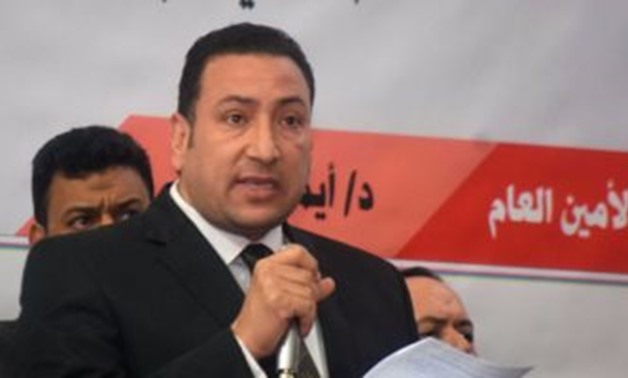
FILE - The Chairperson of the Pharmacists Syndicate Mohie Ebeid
CAIRO – 30 January 2018: The Cairo Court of Appeals canceled on Monday the judicial supervision imposed on the Pharmacists Syndicate since 2014, when four members filed a lawsuit accusing the board of intervening in politics and requesting the appointment of a judicial supervisor.
In August, the court accepted the appeal by the syndicate’s board on the verdict in case no. 2738/2014 filed by four members against the Pharmacists Syndicate’s former chairperson Mohamed Abdel Gawad.
Abdel Gawad was accused of allowing members of the outlawed Muslim Brotherhood group to establish a fund for donations utilized to print brochures and organize conferences supporting the terrorist group, as well as providing financial help for its members prosecuted in custody, according to Masrawy.
In the same year, Abdel Gawad resigned and was succeeded by Mohie Ebeid, along with a new board, beating nine rivals in the election.
The syndicate released a statement on Monday saying that the court's ruling is aligned with the constitution, prohibiting the imposition of judicial supervision over professional syndicates.
What is Judicial Supervision?
The court appoints a judge to observe all financial actions in an entity that is subject to conflict. The supervision is temporary and expires once the conflict is resolved. The supervision does not strip stakeholders from their right in managing the entity but just ensures that no party is denied its legal share in the entity’s assets or revenues; judicial supervision is most common in inherited real estate and land.
Judicial Supervision on Professional Syndicates
Judicial supervision on professional syndicates is imposed by court rulings when a member or more file a case against the board in office, demanding so and providing valid documents proving financial issues or breaches.
The Engineers Syndicate had been subject to judicial supervision for 17 years. In less than one year after it had been terminated, some members filed a lawsuit in 2015 to re-impose the supervision over the syndicate because of a LE 110 deficit in the budget, which was approved in a general assembly attended by only two percent of the members, so it lacked a quorum which is three quarters of the members.
 FILE - Engineers Syndicate Headquarters in Cairo
FILE - Engineers Syndicate Headquarters in Cairo
However, the judicial supervision was not imposed on the engineers syndicate. The board had clarified that the deficit occurred because of the increase in pensions and stipends granted to members, whose total number is 482,000.
The School Teachers Syndicate was subject to judicial supervision since 2014 until February 2017. The court necessitated that an election would take place within six months since the issuance date of the ruling to form a new board. A judicial supervision lawsuit was filed by members accusing the former board dominated by Muslim Brotherhood affiliates of embezzlement.
The Journalists Syndicate: Cairo Court rejected a case by some members against the former chairman Yehya Kalash to put the syndicate under judicial supervision in 2016. That was after two member journalists – Amr Badr and Mahmoud el Sakka - were hidden in the syndicate’s headquarters after an arrest warrant had been issued against them for breaching the demonstrations law and attempting to destabilize the country’s security. Amr Badr is a member in the current board elected in 2017.
 FILE - Journalists Syndicate Headquarters in Cairo
FILE - Journalists Syndicate Headquarters in Cairo


Comments
Leave a Comment